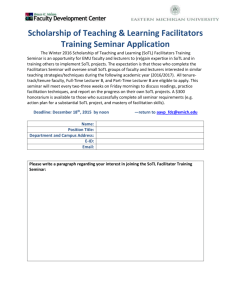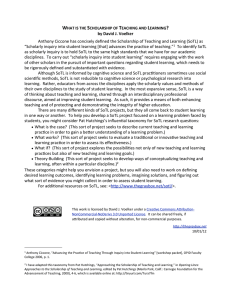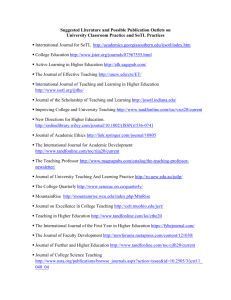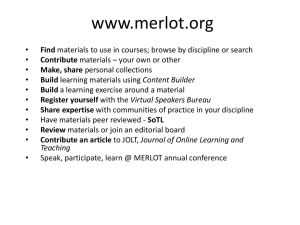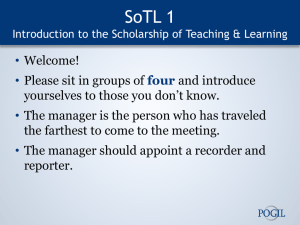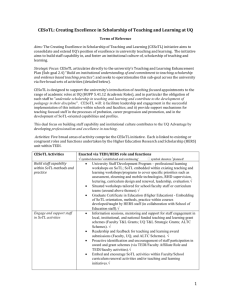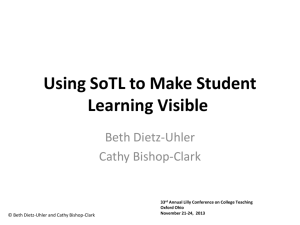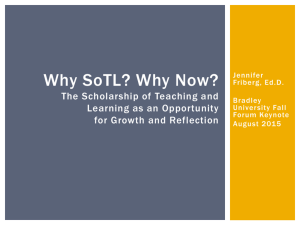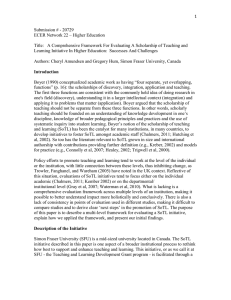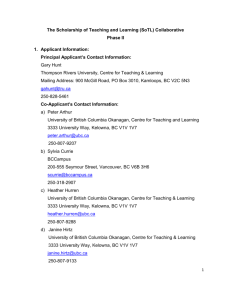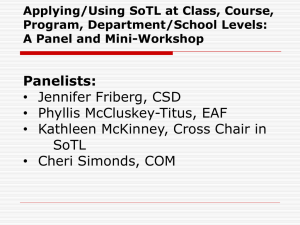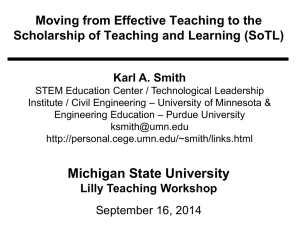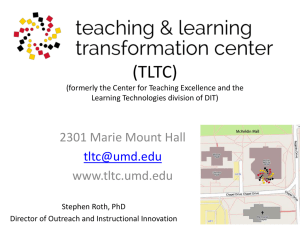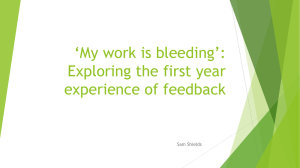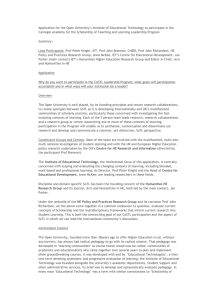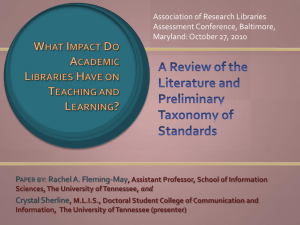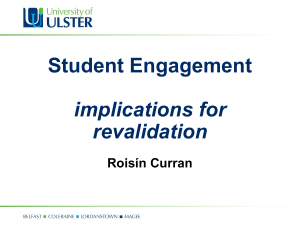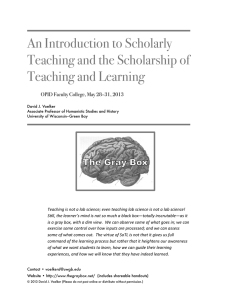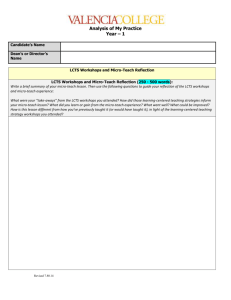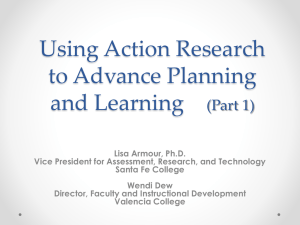Advanced SoTL
advertisement
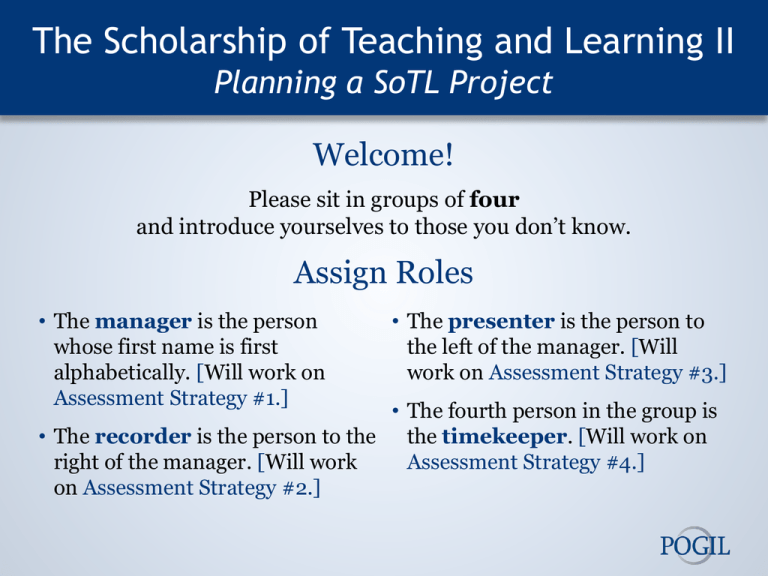
The Scholarship of Teaching and Learning II Planning a SoTL Project Welcome! Please sit in groups of four and introduce yourselves to those you don’t know. Assign Roles • The manager is the person whose first name is first alphabetically. [Will work on Assessment Strategy #1.] • The presenter is the person to the left of the manager. [Will work on Assessment Strategy #3.] • The fourth person in the group is • The recorder is the person to the the timekeeper. [Will work on right of the manager. [Will work Assessment Strategy #4.] on Assessment Strategy #2.] Workshop Goals Participants in this workshop will: • Explore a variety of ways in which evidence of student learning can be collected for SoTL projects • Consider the logistical steps that must be taken to execute a SoTL project • Create a plan for getting a SoTL project started The Scholarship of Teaching and Learning The POGIL Project’s working definition of SoTL: Investigations that begin with the purpose of understanding and improving teaching and learning within a classroom or institution, leading to results that can be shared beyond your classroom. All SoTL projects start with a question focused in a particular area (see Examples of Classroom Questions) • Types of SoTL questions • Focus Areas What is your SoTL question? Take 1 minute to free-write on your index card so you have a SoTL question in mind during the session. OR… choose/modify a question from the sheet of example questions (and write it on your index card) SoTL Question Round Robin In your group, read each SoTL question out loud, without discussion 1. Start with manager, proceed to manager’s left 2. Raise a hand when your table is done What To Do with Your Question? • What kind of data do you need to collect to address your question? • What kind of assessment strategies will you use to generate the data? • When or how often will you collect data? • What are your data likely to look like? • How will you analyze the data? Exploring Assessment Strategies with JIGSAW • Manager = group member #1 • Recorder = group member #2 • Presenter = group member #3 • Timekeeper = group member #4 http://serc.carleton.edu/NAGTWorkshops/coursedesign/tutorial/jigsaw.html Expert Group Set-Up • Proceed to your Expert Group (5 min). • Expert Group manager: • Person whose institution name is earliest alphabetically • Keeps group on task • Recognize that each group member will serve as a presenter back in your home group • Consider taking notes you can use Expert Group Exploration • Review your assigned strategy (1 min). • As a group (12 min): 1 Identify an example of a SoTL question for which this kind of assessment might be valuable. 2 Discuss how the data might be collected, what the data would look like, and how they could be analyzed. 3 Be prepared to present your topic to your home group. 4 If you have time, repeat for a second SoTL question. Home Group Discussion Return to your home group. Each Expert presents and leads a discussion about his or her SoTL questions and data collection strategy (5 min). Individual Planning for Data Collection • Consider your tentative research question. • Choose one or more types of data that would be most useful in addressing your question. • Identify a logistical strategy for collecting the data: • When will data be collected, and from whom? • Will the data be anonymous or not? • Will the instructor collect the data, or will someone else? • How will the data be analyzed? • Is IRB approval needed for the use of human subjects? • Does your research question need to be modified in light of data collection strategies? (7 min) Reporting and Group Feedback • Each group member takes 4 minutes to share ideas and get feedback (16 min): 1. Member presents his/her ideas (2 min) 2. Member listens and takes notes while others offer questions and suggestions (2 min) • After 4 minutes, move to the next group member • After all group members have received feedback, take 5 minutes for individual work to consolidate ideas. Wrap-up • In groups, discuss something you learned today that helps you to be more prepared to begin a SoTL project. • If time permits, choose one insight to share with the other groups. Get Started! • Start collecting data • Follow your data-collection plan • Consider keeping track of other data that might not seem immediately useful, but could be valuable later (scans of exams and homework assignments, student self-assessments, etc.) • Remember that some projects yield results quickly, but most take several semesters of data collection, plus trial and error • Your SoTL question might need focusing or redirection • Your data collection might need broadening or narrowing • The information you collect should inform your teaching, and possibly be able to be compiled into a report for use beyond your classroom. • Don’t hesitate to ask for help
